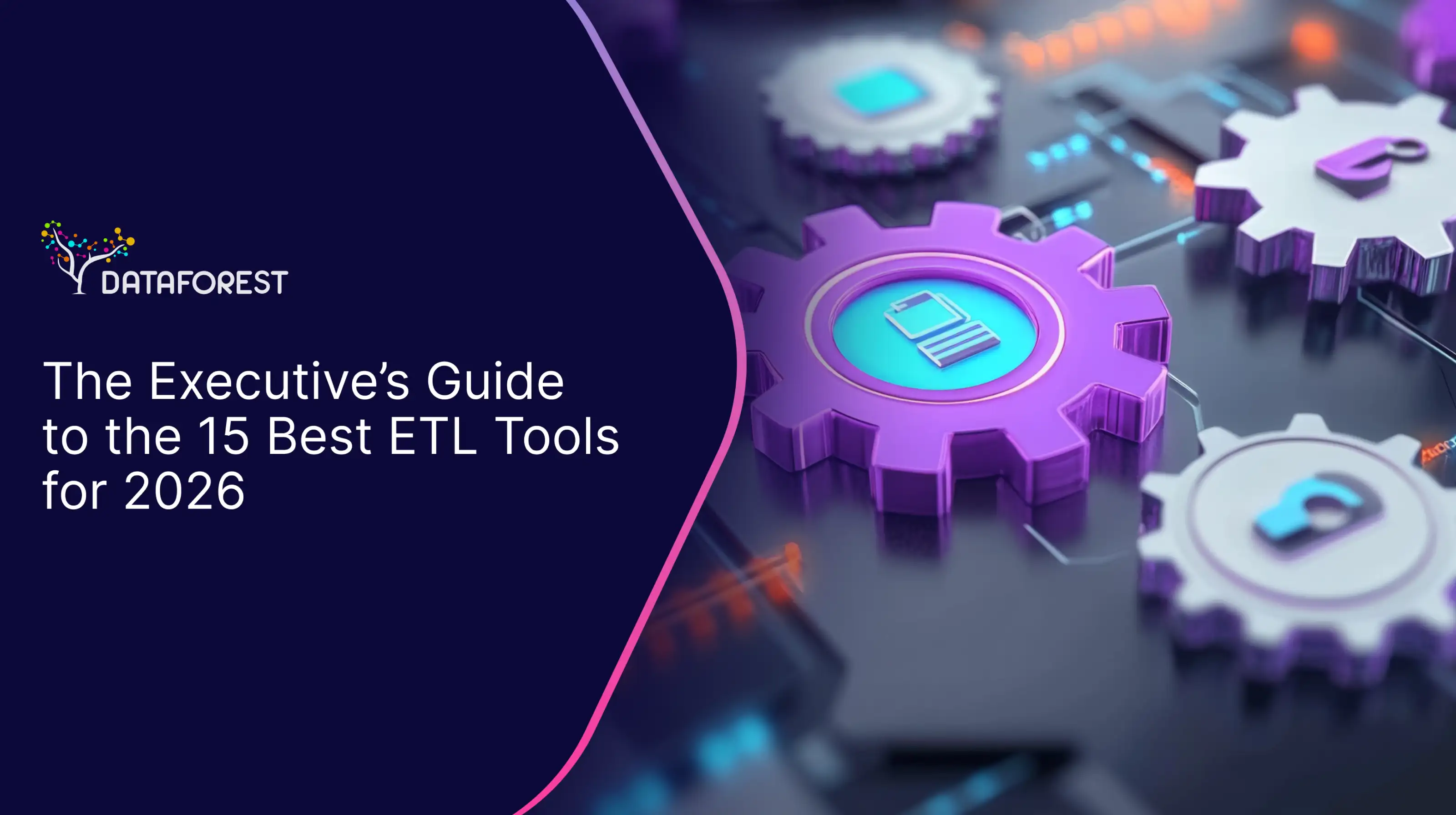The real estate market has always been about decisions—what to buy, when to invest, how to assess risks, who to entrust the property to. Previously, these decisions were made based on intuition, experience, or, at best, using Excel spreadsheets. But the world has changed. And in an era where artificial intelligence analyzes markets faster than analysts and more accurately than valuation models, traditional methods slow down the process of digital transformation.
Against the backdrop of increasing data volumes and market complexity, traditional approaches no longer provide the necessary level of flexibility and scalability. That is why the implementation of AI solutions and data-driven real estate strategies are gradually becoming not a competitive advantage, but a condition for sustainable development.
In this article by DATAFOREST, we will consider the key areas in which AI brings practical value to business, typical challenges that arise during integration, examples of real-world applications, as well as a step-by-step strategy for those just starting this path. Book a call to discuss specific cases for your real estate business with our Gen AI consultant.
Key Business Areas Where AI Creates Value
AI is already being implemented into key parts of the real estate value chain. The main value lies in the ability to quickly process large amounts of data, identify patterns, and assist in making decisions that were previously based on assumptions or limited experience.
Among the main areas where artificial intelligence is demonstrating practical results are:
- real-time valuation of objects taking into account market fluctuations,
- more precisely, forecasting investment attractiveness,
- automated management of customer requests and selection of objects,
- optimization of technical maintenance and property management.
Let’s review each of these areas in detail.
Smarter Property Valuation and Dynamic Pricing
Accurate property valuation is critical for developers, investors, and agencies. However, in a constantly changing market environment, traditional models—static and limited—often fail to take context into account: changes in demand, nearby infrastructure projects, seasonality, or even buyer behavior.
AI solutions allow pricing to be based on real-time data from multiple sources—from transaction history and market analytics to geodata and economic indices. Such models don’t just “compare” properties, but also predict the optimal price based on the probability of sale in a specific period.
For rental businesses, this opens up the opportunity to implement dynamic pricing: as in the hotel or aviation industry, changing prices depending on demand, events in the city, or occupancy. This not only increases revenue, but also better manages customer expectations.
Predictive Analytics in Real Estate for Investment Decisions
Investing in real estate is always accompanied by a high level of uncertainty—from fluctuations in demand to regulatory changes. Artificial intelligence helps reduce this uncertainty by providing businesses with predictive models that are based on real data, not hypotheses.
AI algorithms analyze hundreds of variables simultaneously: economic indicators of the region, demographic shifts, development within a radius of several kilometers, transport accessibility, even social trends. The result is substantiated forecasts of the increase or decrease in value, rental yield or payback of the object.
Such tools are especially useful when choosing locations for a new project, assessing risks before purchasing commercial real estate or when forming a portfolio strategy for funds.
Intelligent Lead Scoring and Client Matching
In the traditional real estate sales model, managers spend a significant amount of time communicating with clients who are not ready to make a deal or do not fit the profile of the target buyer. AI helps automate and significantly improve this process through intelligent lead scoring and algorithms for matching requests to properties.
Based on behavioral history, demographic data, budget, requests, and level of engagement, artificial intelligence can estimate the probability of conversion of each potential client. This allows the sales team to prioritize efforts and focus on the most promising leads.
AI is also able to automatically suggest relevant properties based on customer preference models, even if they are not directly stated. The result is a shorter sales cycle, higher customer satisfaction, and fewer “lost” opportunities.
Automated Property Management and Maintenance
Property management involves a lot of routine processes: tenant requests, technical inspections, cost control, communication with contractors. AI can significantly reduce manual involvement, automating both daily tasks and strategic planning.
Systems with elements of AI are able, for example, to predict likely equipment breakdowns based on sensor data or repair history. This not only reduces the risk of costly downtime, but also improves the tenant experience - problems are resolved before they become complaints.
Implementation Challenges — and How to Overcome Them
AI offers great opportunities, but integrating it into real-world business is not always easy. Data can be fragmented, teams can be unprepared, and technology choices can be confusing.
Typical barriers include unstructured or incomplete data, lack of internal AI expertise, and difficulty scaling solutions after a pilot. But all of these challenges can be overcome—if you approach implementation systematically.
The Data Gap: Structure, Cleanliness, and Access
Data is the foundation of any AI solution, and it is often where the biggest problems arise. In real estate, information is stored in different systems: CRM, ERP, external sources, spreadsheets, and often in paper archives. This creates difficulties with their integration and quality.
Typical problems with data:
- Lack of a single repository: data is scattered across different platforms
- Lack of cleanliness: duplicates, errors, outdated information
- Limited access: legal or technical barriers to data collection and processing
- Lack of structure: most data in real estate does not have a clear form for analysis
For AI to work effectively, these problems must be eliminated at the stage of data preparation—organize, clean, create a single database. This way, reliable predictive models can be built and high-quality analytical insights obtained.
Buy vs Build: Choosing the Right AI Path
Choosing between ready-made AI solutions and developing your own tools is a key issue for many companies. Let’s compare these two options:

The choice depends on the specific goals, resources, and company’s timeframes. Often, companies start with pre-built solutions to quickly test AI tools, and then move on to custom development as scale and requirements grow.
Talent and Change Management
The implementation of AI often requires new roles—analysts, data engineers, AI facilitators, but training existing employees to work with new tools is also extremely important.
The main tasks at this stage are:
- Explain the business goals of implementing AI
- Ensure support for change at the management level
- Involve the team in the process from the very beginning
Real-World Use Cases — AI in Action
McKinsey notes: the true value of AI-powered solutions is revealed when a business does not just collect data, but asks the right questions. That is when practical answers appear and a competitive advantage.
A few examples of real-world use cases:
- Housing complex operators are implementing virtual assistants for property management—digital assistants that process tenant applications, remind about payments, coordinate repair crews. This reduces the workload on staff and improves the customer experience.
- AI-powered CRM for realtors helps real estate agencies automatically select objects based on user behavior.
- Real estate funds and investors use real estate investment algorithms to analyze risks and predict the profitability of projects in different economic scenarios.
- Automated rental pricing is increasingly used in the rental sector. The system changes prices in real time depending on demand, season or occupancy.
- In commercial real estate, big data in property analysis allows you to take into account macroeconomic factors, transport accessibility and behavioral patterns of tenants when making decisions.
One of the DATAFOREST’s real estate clients requested a lead generation web application. The requested platform provides the possibility to search through the US real estate market and send emails to the house owners. With over 150 million properties, the client needed a precise solution development plan and a unique web scraping tool.
Getting Started — A Roadmap for Business Owners
Implementing AI-powered solutions in real estate doesn’t require immediate radical changes. The key is to move gradually: from assessing internal resources to launching the first pilot. Here’s a basic roadmap:
Step 1: Audit Your Data Infrastructure
Evaluate how usable your current data is: do you have real-time property data, how easy it is to integrate real estate data, which systems store customer information. This is critical for further automation and workflow optimization.
Step 2: Define Clear AI-Driven Business Goals
Don’t launch AI “for the sake of technology.” Set clear business objectives: reduce time to sale, increase valuation accuracy, optimize costs. This could include, for example, implementing AI-based lead scoring or launching smart real estate solutions for property management.
Step 3: Start with a Pilot Project
Choose a specific area: for example, automated portfolio management or AI chatbots for initial interaction with customers (AI real estate chatbots). This allows you to test hypotheses without major risks and show value to the team.
Final Thoughts
Artificial intelligence is gradually changing the rules in real estate, from the daily work of agencies to the strategic planning of large investments. The use of machine learning, property forecasting tools, and real estate business intelligence allows companies to act more accurately, faster, and with less risk.
Further growth of real estate technology trends: the role of digital assistants will grow, new tools for real estate automation will appear, and competition will increasingly depend not on the number of agents, but on the quality of AI-powered CRM for realtors and the ability to make decisions based on data.
Ready to discuss how AI can work in your case? Fill out the form, and the DATAFOREST team will help you assess the current infrastructure, identify growth points, and implement a custom solution for your business goals.
FAQ
How can AI help reduce property vacancy rates or time on market?
AI analyzes demand, market trends, and customer behavior to optimally set the price, improve the positioning of the property, and find relevant tenants or buyers faster.
How accurate are AI-powered valuation models compared to traditional appraisals?
AI models take into account many more variables in real time, so they often provide higher accuracy, especially in dynamic market conditions.
What types of data do we need to start using AI effectively?
We need structured data about properties (location, area, price, type), transaction history, customer behavioral data, query analytics, and external sources (economics, infrastructure, demographics).
Can AI automate tenant communications and property management tasks?
Yes, AI can answer common queries, send reminders, coordinate service, and generate reports — through chatbots or virtual assistants.
What’s the best way to start – should we use pre-built platforms or develop custom AI?
It all depends on your goals. Ready-made platforms — fast start and lower costs. Custom development — more flexibility and precise alignment with business needs. Sometimes the best option is a combined approach.







.svg)
.webp)


.webp)












